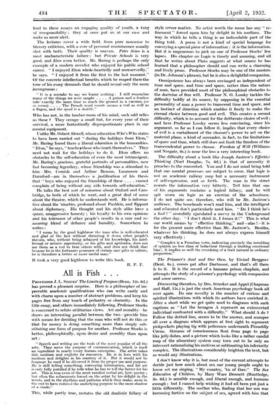All is Fish . . .
PROFESSOR J. L. STOCKS' The Limits of Purpose (Benn. 12s. 6d.) has proved a pleasant surprise. Here is a philosopher of im- peccable academic qualifications who can write easily and with charm upon a number of abstract problems, and keep his pages free from any touch of pedantry or obscurity. In the title essay, and others immediately following. Professor Stocks is concerned to refute utilitarian.views. Art and morality—he draws an interesting parallel between the two—provide- him with means for deciding that the man who will not do this or that for money is doing something more than simply sub- stituting one form of purpose for another. Professor Stocks is better, philosophically, upon desire and morality than upon art : " Speech- and writing are the tools of the most popular of all the arts. They serve the purpose of communication, which is itself an ingredient in nearly every human enterprise. The artist takes this medium and exploits its resources. He is in love with his medium and delights in his mastery of it. But it would not be liniguage he used if he divorced it from its proper use and purpose. Ile is still telling something, convoying information, and his art is only fully justified if he tells what he has to tell the better for his art. This is true even of the most rarefied verbal art, lyric poetry ; but often the refinements forced on the artist by his delight in the words, and in the rhythms and patterns which they make, seem in
the end to have reduced the underlying purpose to the more shadow of a shade."
This, while partly true, restates the old dualistic fallacy of
style versus matter. No artist worth the name has any " re- finement " forced upon bhn by delight in his medium. The way in which he tells a thing is an indissoluble part of the thing told. A poem is not a kind of special language for conveying a special piece of information : it is the information. But it is ungenerous to pick on one of Professor Stocks' few lapses. His chapter on Logic is timely and amusing, and all that he writes about Plato suggests at what source he has learned that a philosopher should and can write a charming and lively prose. Professor Stocks may be one of the masters (in Dr. Johnson's phrase), but he is also a delightful companion.
Omnipotence has always been envisaged as independent of time and space, and time and space, rather than the nature of man, have provided Most of the philosophical obstacles to the doctrine of free Will. Professor N. 0. Lossky tackles the difficulty boldly at its source, by supposing in the essential personality of man a power to transcend time and space, and an instinct of direction which enables it freely to make the eternal choice between good and evil. This creates a second difficulty, which is to account-for the deliberate choice of evil ; and here Professor Lossky seems. less convincing, since his argument, so far as I can follow it, implies that every choice of evil is a curtailment of the chooser's power to act on the material plane, a kind of surrender, in fact, to the limitations of space and time, which still does not limit the freedom of the transcendental power to choose. Freedom of Will (Williams and Norgate, 6s.) is none the less a very interesting book.
l'he difficulty about a book like Joseph Jastrow's Effective Thinking (Noel Douglas, 7s. 6d.) is that of necessity it preaches to the converted. You and I do not mind being told that our mental processes are subject to error, that logic is not an academic railway map but a necessary instrument of self-expression, and so forth. The man in the street resents the information very bitterly. Tell him that one of his arguments contains a logical fallacy, and he will spit scorn on logic as an exercise of the schoolinen.
do not quite see, therefore, who will be Mr. Jastrow's audience. The boneheads won't read him, and the intelligent and educated don't particularly need him. " Do I think he's a fool ? " scornfully ejaculated a navvy in the Underground the other day. "I don't think it, I knows it!" This is what our world means by effective thinking," and—alas !—it is for the present more effective than Mr. Jastrow's. Besides, whatever his thinking, he does not always express himself very effectively :
" Complex is a Freudian term. indicating precisely the moulding of opinion no loss than of behaviour through a limiting emotional bias ; it implies as well the overdoing of a trait natural in ordinary proportion."
































 Previous page
Previous page